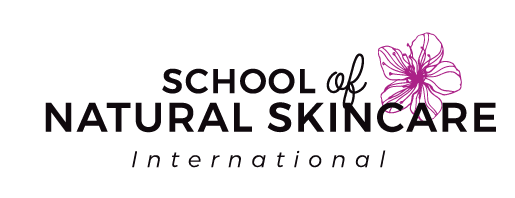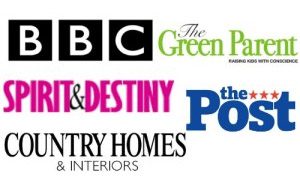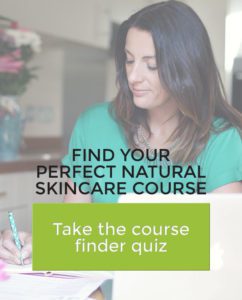Vegan skincare products, therefore, do not use or contain animal-derived ingredients and are created in such a way that no harm is done to animals throughout the whole process ie you won’t find products or ingredients in vegan products that are tested on animals!
Simple examples of animal-derived cosmetic ingredients are beeswax and lanolin, but there are many others.
Are vegan cosmetics natural?
Vegan products are not necessarily natural, just as natural products aren’t necessarily vegan.
It is possible to create a vegan product—one which does not contain any animal or animal-derived ingredients, and which is not tested on animals—that still contains ingredients which are not ‘natural’ by some measure of ‘natural’ standards. Synthetic ingredients derived from petrochemicals are not permitted in natural standards but would be permitted by vegan certifications (as long as animal testing has not taken place).
It can be a little confusing, so we created this image to show the difference between vegan and natural and where the two can meet:
Does it matter if vegan products aren’t necessarily natural?
Well, that depends on your personal ethics, goals, and priorities for the products you purchase and use.
If your priority is using vegan products, and you trust brands to create products according to your vegan values, but you aren’t concerned about whether the products are natural, organic, or synthetic, then it doesn’t really matter. Ensuring the cosmetics you use are vegan will satisfy your needs.
However, if you are here because you want to ensure that your products are both vegan AND as natural (or organic) as possible, then it does matter. You cannot just assume that a vegan product is free of synthetic ingredients.
Being informed is the first step in ensuring that the products you purchase match your own code of ethics—whether that’s vegan, natural, or the best of both worlds! That’s why we have created our free mini email training series: Formulating for the conscious consumer!
How can you be sure you are buying truly vegan and/or natural cosmetics?
If you want to know what’s in the cosmetic products you are using, then you’ll want to know how to read the labels.
Labels are useful because they tell you exactly what’s in the products you are buying and using, but they can also be a little unhelpful. They use scientific terminology which can make it extremely hard to understand what the labels are actually saying and what exactly is in the products you are using.
To help you with this, we created a handy article! It’ll help you to learn how to read cosmetic labels and decipher what’s in your products!
Vegan and natural certifications
There are specific symbols and certifications on vegan and/or natural products which ensure they have met certain criteria for the certifying body.
Before you buy, do the research to find out about the brand:
- What certifications do they have?
- What does the company stand for?
- What are their values?
- What do they tell you about themselves, their brand and their products?
You can also check the label and packaging as you are out shopping.
Be familiar with what the different symbols mean. For example, the ‘Leaping Bunny’ certification is a common one found on vegan products, but it can only certify that the product was not tested on animals.
Research the different certifications products have. Who are the certifications from and what do they mean? Also, if the products claim to be certified and yet there are no recognized symbols to verify that, you’ll probably need to question it.
Read the name and the description as well as any claims made. Just remember, claims can sometimes be misleading, so make sure you always look at the whole picture!
And if in doubt, you can always reach out to the brand to get information from them personally.
By doing all (or any of this) you are arming yourself with knowledge that will enable you to be a savvy shopper! Knowing how to decipher a label will absolutely help you find the kind of products that match your values—vegan, natural, organic, fair trade, you name it.
But if you truly want to know and be in control of what’s in the products you use, the best way is to make your own!
Formulating your own vegan and natural skincare products
If you learn to formulate your own skincare products, you can tailor them to your own needs, concerns, skin type and also values. You can deliberately select ingredients that conform to what you want and what you value.
Plus, by learning how to make your own products, you’ll learn more about cosmetics in general, the ingredients used—natural and synthetic, vegan or animal-derived—and you’ll be able to make more informed choices. And if you make them to sell, you’ll be playing a part in making the movement even bigger than it currently is.
If you want to learn how to get started formulating vegan cosmetics, this article is a great introduction! You can also check out our Diploma in Natural Skincare Formulation for everything you need to know to design, formulate, and sell your own safe, natural skincare products, start-to-finish.
Taking our Diploma in Natural Skincare formulation enables you to create products the way you want to – natural, organic, vegan and natural, vegan and organic – the possibilities are endless!
FREE GUIDE:
The Beginner’s Guide to Formulating Natural Skincare Products (From scratch, like a professional!)
Start creating your own natural skincare products
from scratch – rather than simply following recipes!
Exclusive for our newsletter subscribers. Sign up now.
Download this fabulous guide and you’ll learn:
- What formulating is and why you need to be doing it!
- The difference between following recipes and formulating your own products.
- How to formulate like a pro! Seven top tips for becoming a confident skincare formulator.
- Our step-by-step process to designing products people love.
- Four easy ways to personalize your skincare products.
- Choosing the right carrier oils for your beauty products.
PLUS: Receive two free worksheets!
Love reading about vegan Skin care? Save this image below on Pinterest so you can be sure to remember!
















